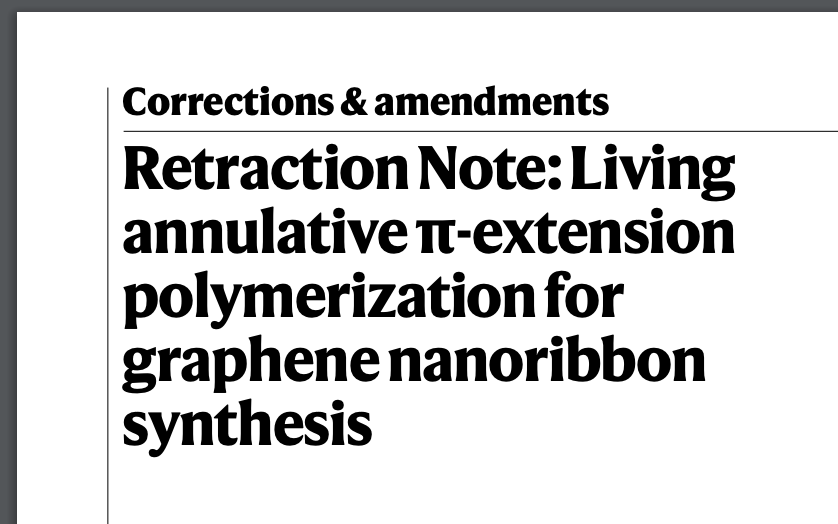
A group of authors at Nagoya University and Kyoto University have retracted a 2019 Nature paper because of errors.
Here’s the retraction notice:
We would like to retract this Letter. Nature previously issued an Editorial Expression of Concern (https://doi.org/10.1038/s41586-020-2756-0) after we, the authors, alerted the journal to potential problems with the matrix-assisted laser desorption/ionization time-of-flight (MALDI–TOF) mass spectrometry data. These issues undermine our confidence in the integrity of the study as a whole and we therefore now wish to retract the Letter. Our group continues to explore the synthesis of graphene nanoribbons (GNRs), but we have been unable to reproduce some of the results presented in this Letter. Careful scrutiny of the source data has identified potential problems with the manner in which the MALDI–TOF mass spectrometry data in this Letter were originally generated and processed. Specifically, the exact molecular weights (m/z calculated for [M]+ and [M + Ag]+) of GNRs 2 (Extended Data Fig. 1), 7 (Extended Data Fig. 6) and 8 (Extended Data Fig. 7) were calculated wrongly on the basis of the assumption that all carbon atoms in these GNRs were 12C (monoisotopic). In all GNRs, the exact mass peaks should appear approximately 6 to 9 mass units higher. Thus, the observed mass spectra do not match the proposed GNR structures. The isotopic patterns of some GNRs (for example, Extended Data Fig. 7c, d for GNR 8) do not match the (correct) calculated spectra. These also do not support the formation of the proposed GNR structures. The baselines (noise) of the mass spectra of GNRs 2 and 8 appear to be identical, which calls into question the integrity of the mass data. The original MALDI-TOF mass spectrometry data are unavailable and only editable secondary data exist, which also raises concerns regarding the integrity of the mass data. We regret any confusion and apologize to the scientific community.
As the retraction notes, the paper had been subject to an expression of concern on September 18:
The authors have alerted the editors of Nature to potential problems in the manner in which the MALDI–TOF mass spectrometry data in this Letter have been generated and processed, and these will have an impact on the conclusions that can be reliably drawn. Nature is working with the authors to resolve the matter, but in the meantime, readers are cautioned against using results from this Letter.
Neither of the corresponding authors, Hideto Ito or Kenichiro Itami, responded to a request for comment about how they came to realize there were errors.
The paper has been cited 37 times, according to Clarivate Analytics’ Web of Science, earning it a “highly cited paper” designation.
Update, 1200 UTC, 11/28/20: Ito and Itami tell us that they and their co-authors requested Nature retract their paper a month before the expression of concern was published:
After the publication of this Nature paper, our group has been engaged in the synthesis of a range of graphene nanoribbon (GNR) related materials. However, from around January this year, we faced a difficulty in reproducing the efficiency and structural control in the GNR synthesis protocol reported in this paper. Triggered by this, our lab initiated to carefully scrutinize the data in this paper and we found very serious concerns with MALDI-TOF-MS data of the GNRs in mid-August.
Taking the situation very seriously, we immediately informed to our university asking to establish an investigation committee to uncover the truth, which is still ongoing and might take some time to conclude something. At the same time, we thought we should retract the paper (independent to the committee’s decision) and sent the request to Nature editor on August 18th after getting approval form all coauthors. After the Editorial Expression of Concern (September 18th), the final retraction became open on November 25th, 2020.
We deeply regret any confusion that may have been created by publication of this work and sincerely apologize to the scientific community.
Hat tip: Lemonstoism, author of World Fluctuation Watch
Like Retraction Watch? You can make a tax-deductible contribution to support our work, follow us on Twitter, like us on Facebook, add us to your RSS reader, or subscribe to our daily digest. If you find a retraction that’s not in our database, you can let us know here. For comments or feedback, email us at [email protected].